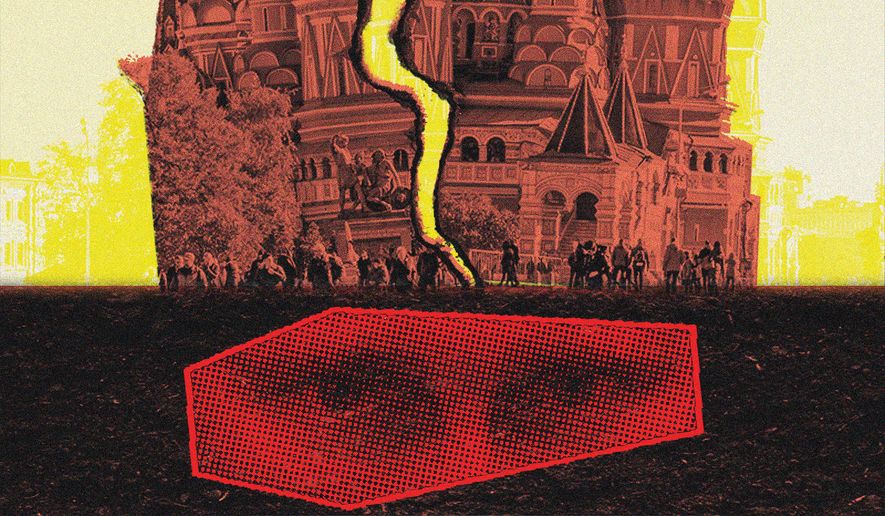OPINION:
In his famous short story “The Fall of the House of Usher,” Edgar Allan Poe crafted a haunting narrative of the effects of isolation. Roderick Usher, the titular character of the story, lives a reclusive existence in his family’s old mansion, and his paranoia increases until the story culminates in his madness. As the world considers the recent actions of Russian despot and war criminal Vladimir Putin, this tale’s depiction of the destructive nature of isolation and escalating paranoia comes to mind.
Mr. Putin’s invasion of Ukraine has not gone according to his plan. That is clear to anyone who has watched the events of the current offensive that began in late February. Ukraine has proved to be a much tougher nut to crack than the Russians expected. The Russians may have anticipated that their show of force could provoke the collapse of the Ukrainian government within a few days of the invasion. Now, the Russians find themselves in disarray as they engage in fierce combat with courageous Ukrainian defenders across the country.
A former KGB agent who advanced through the tumultuous 1990s to become head of the FSB before becoming the leader of Russia, Mr. Putin is naturally suspicious and secretive, keeping his plans in the dark. Such traits, which have been indispensable to his rise in Russian politics, are a double-edged sword that has contributed to his extreme seclusion, leading to critical miscalculations and poor organization in the present conflict. According to some reports, the invasion’s timing came as a surprise to many of Russia’s senior leaders and tossed them into a situation they were unprepared to handle.
In war, miscalculations can lead to disaster. Mr. Putin and his military leaders both overestimated their forces’ capabilities and severely underestimated the strength of the Ukrainian resistance. The Russian army has thus far been plagued by poor logistical operations, careless tactics and significant difficulty in executing a multi-front invasion. Likewise, the Russians have not yet gained air superiority over Ukraine despite having a substantial advantage in airpower. Although the Russians have made advances, particularly in the south, their progress has been sluggish, and the fighting has exposed severe vulnerabilities in Russia’s military strategy and tactics. Conversely, the Ukrainians, armed with Western weapons and fighting fiercely to defend their homeland, have put up a stiff resistance that has exacted a steep price from Russian troops.
Furthermore, it seems that Mr. Putin did not expect and was not prepared for the robust international response to his invasion. This may drive him further into his paranoiac isolation. The sanctions against Russia’s economy are some of the harshest ever imposed on a country of its size, threatening to devastate an economy that is highly dependent on the export of natural resources, especially oil and gas.
This puts Mr. Putin in a dangerous position, as his isolation from even his closest advisers could lead him to escalate the conflict and make further ill-considered decisions. Just last week, Mr. Putin had one of the top generals of his invading units arrested for allegedly leaking intelligence and squandering fuel. If his invasion continues to encounter setbacks and higher-than-expected casualties, Mr. Putin’s paranoia could lead him to further miscalculations. What was supposed to be a prime opportunity for Russia to reassert its dominance over a former Soviet territory has instead revealed its weakness.
Mr. Putin is more than just a paranoid ruler backed into a corner. He is an evil dictator obsessed with power and has been for a long time. But will Mr. Putin isolate himself further and allow his paranoia to fuel greater mistakes? In the Poe story, the reclusive Usher’s growing suspicion steers him into catastrophic mistakes that end in tragedy and the collapse of the house. Mr. Putin would be foolish to let his obsession to reunite the Soviet Union drive him to double down on his errors and insist on a decisive military victory in Ukraine. Instead, he should cut his losses and call off the invasion to bring an end to this destructive and needless war.
• Rep. Mark Green is a physician and combat veteran of Afghanistan and Iraq where he served three tours. He interviewed Saddam Hussein for six hours on the night of his capture. He serves on the House Armed Services and Foreign Affairs Committees.




Please read our comment policy before commenting.